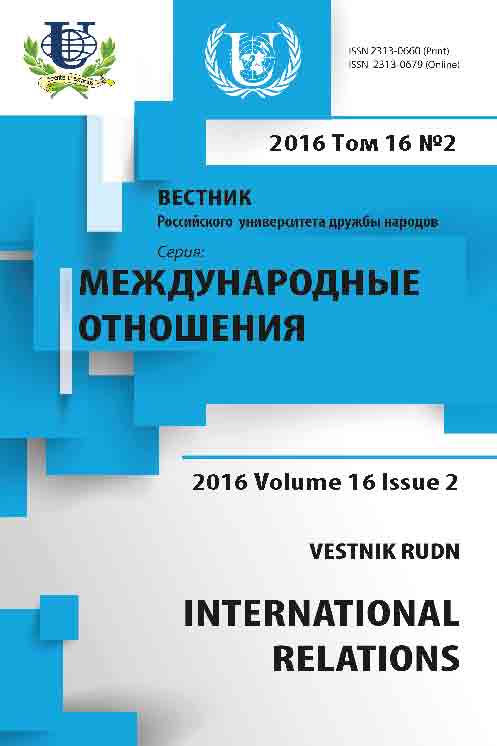The new start for Russian-African relations
- 作者: Korendyasov E.N.1
-
隶属关系:
- Institute for African Studies of RAS
- 期: 卷 16, 编号 2 (2016): Africa in International Relations
- 页面: 203-214
- 栏目: Articles
- URL: https://journals.rudn.ru/international-relations/article/view/14269
如何引用文章
全文:
详细
Russia's return to Africa is widely discussed in the Russian and foreign scientific and expert circles, on the pages of newspapers and magazines. This covers a broad range of problems of country, regional and global scale, put forward and voiced conflicting estimates and judgments. Abroad, actively promoted the interpretation of the “return” of Russia to the continent as a new direction of neo-imperial ambitions of the new Russia and its aspirations to weaken the position of the West, “golden” its image in the developing countries, in the eyes of Africans. Author analyzes the impact of the emerging political, economic and social realities of the XXI century on the development prospects of the African continent in general, and on the Russian-African relations in particular. The author concludes that the increase in the weight and role of the continent in world politics and economy today requires a rethinking of the Russian approaches to the problems of scale Russian-African partnership and the formation of its long-term vision, building on the existing political, diplomatic and investment and the country's financial resources. The new dynamics of Russian-African relations is connected, first of all, with the development of partnerships in those areas where Russia has competitive potential, production capacities, high competence and experience. Including the development of natural resources, nuclear power and hydropower, military-technical cooperation, the establishment of satellite information and communication systems, cooperation in the sphere of education, health, the fight against epidemics, natural catastrophes. Russia is confident enough to overcome the deep recession of relations with Africa, recorded in the late 80's and 90-ies of XX century. However, it would be premature to claim that full-blooded “return” of Russia to the continent has already taken place. Scaling up comprehensive cooperation will depend, first, on the quality of the stability of the acceleration of development in Africa, the transformation of African economies to modern industrial and technological bases; and, secondly, on the dynamics of socio-economic and socio-political development of the Russian state. Russian potential of weakening the critical dependence on the West increase. Russia, along with the other members of the BRICS can make an impressive contribution to the development of this process as it has been made in achieving the objectives of the Non-Aligned Movement and the Organization of African Unity. History repeats, but at a different stage of development.
作者简介
Evgeniy Korendyasov
Institute for African Studies of RAS
编辑信件的主要联系方式.
Email: ekorendyasov@yandex.ru
Moscow, Russia
参考
- Arbache J., 2008. Is Africa’s Economy at a Turning Point? The World Bank. Research Working Paper 4519. African Region.
- BRIKS-Afrika: partnerstvo i vzaimodeistvie [BRICS-Africa partnership and interaction], 2013. Edit by: T. Deich, E. Korendyasov. Moscow.
- Deich T.L., 2015. Regional'naya politika BRIKS v Afrike [Regional policy of the BRICS in Africa]. Vestnik mezhdunarodnykh organizatsii. Vol.10, no. 2, pp. 206-224.
- Korendyasov E.N., 2013. BRIKS i Afrika: potentsial partnerstva i vzaimodeistviya [BRICS and Africa: Partnership and cooperation potential]. BRIKS-Afrika: partnerstvo i vzaimodeistvie. Edit. by: T. Deich, E. Korendyasov. Moscow, pp. 48-75.
- Perspektivy i strategicheskie prioritety voskhozhdeniya BRIKS [Prospects and strategic priorities of BRICS ascent], 2014. Edit. by: V.A. Sadovnichiy, Yu.V. Yakovets, A.A. Akaev. Moscow, HKI BRIKS, pp. 154-155.








